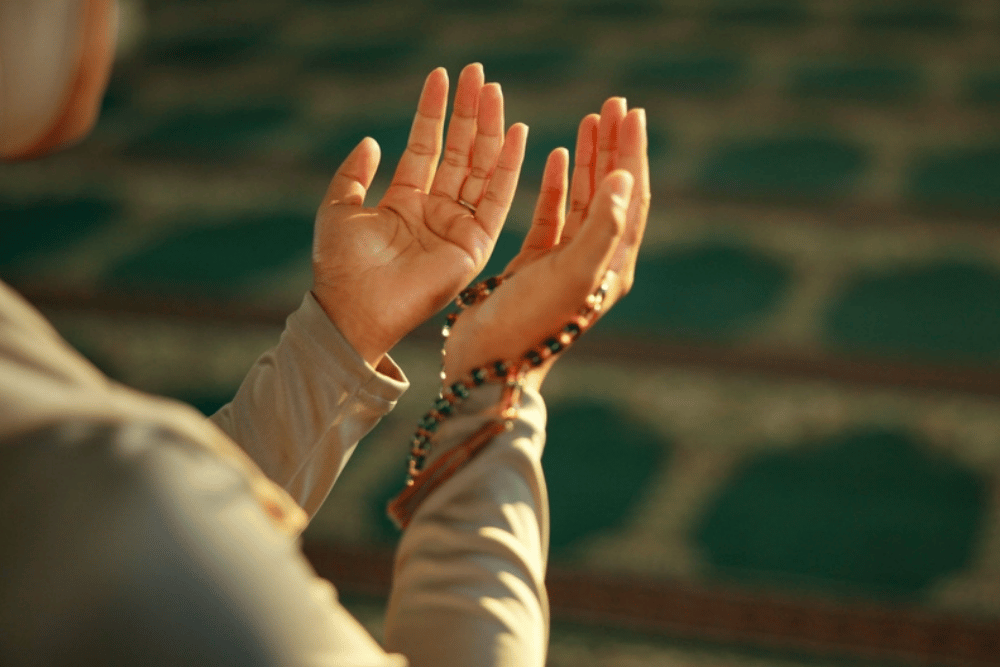Introduction:
Stress often arises from our relationships with those around us—whether it’s a difficult situation at work, a misunderstanding with a friend, or tension within the family. These situations can be emotionally draining, but Islam gives us the tools to handle them with grace and patience. It teaches us how to build peaceful relationships by practicing gratitude, forgiveness, and focusing on the positive qualities in others. When we learn to be content with what we have and genuinely wish well for those around us, we create a peaceful environment for ourselves and those we interact with. In this article, we’ll discuss how these simple yet powerful attitudes can help us reduce stress and foster harmony in our relationships.
1. Being Satisfied and Content
Contentment is a powerful state of peace. It’s about finding satisfaction in what we have, rather than constantly longing for more. Think of contentment as a moment of closure. There are times when we should strive for something better, but there are also moments when we should pause and say, “This is enough.”
The Prophet Muhammad ﷺ taught us that wealth and poverty are not just about money; they are a matter of the heart.
He ﷺ said:
الْغِنَى فِي الْقَلْبِ وَالْفَقْرُ فِي الْقَلْبِ مَنْ كَانَ الْغِنَى فِي قَلْبِهِ لا يَضُرُّهُ مَا لَقِيَ مِنَ الدُّنْيَا وَمَنْ كَانَ الْفَقْرُ فِي قَلْبِهِ فَلا يُغْنِيهِ مَا أَكْثَرَ لَهُ فِي الدُّنْيَا وَإِنَّمَا يَضُرُّ نَفْسَهُ شُحُّها
“Wealth is in the heart and poverty is in the heart. Whoever is wealthy in his heart will not be harmed no matter what happens in the world. Whoever is impoverished in his heart will not be satisfied no matter how much he has in the world. Verily, he will only be harmed by the greed of his own soul.”
(Al-Mu’jam al-Kabeer 2/154)
A man with only a thousand rupees may feel secure and at peace, knowing it is enough to last the week. His heart isn’t troubled, even though his wealth is modest. On the other hand, another man might have crores in savings, but he is consumed with worry about how to earn more, thinking his wealth will soon run out and that he won’t be able to survive comfortably.
This brings us to another challenge we often face: worrying about the future. We spend so much time thinking about what might happen—losing a job, a child’s future, or things beyond our control. These worries can steal our peace in the present. The key is to focus on what we can do now. Tomorrow will come with its own challenges, but they are not ours to solve today.
Ibn ‘Umar رضي الله عنه used to say, “If you survive till the evening, do not expect to be alive in the morning, and if you survive till the morning, do not expect to be alive in the evening, and take from your health for your sickness, and (take) from your life for your death.”
(Saheeh al-Bukhari, Kitaab ar Riqaaq, Hadith 6416)
We must live in the present and do the work we can today, without delaying it for tomorrow.
At times, we worry about distant problems that may never even happen. We imagine worst-case scenarios, but these often do not come true. As believers, we are taught to trust Allaah with the unseen and unknown. A farmer plants seeds, waters them, and prays for rain, knowing he cannot control the weather. Similarly, we should do our part but leave the results to Allaah. Worrying about things we cannot change only causes anxiety. Trust in Allaah’s plan. Whether we succeed or fail in our efforts, the outcome is in His hands.
The Prophet ﷺ said that,
لَوْ أَنَّكُمْ تَوَكَّلْتُمْ عَلَى اللَّهِ حَقَّ تَوَكُّلِهِ لَرَزَقَكُمْ كَمَا يَرْزُقُ الطَّيْرَ تَغْدُو خِمَاصًا وَتَرُوحُ بِطَانًا
“If you were to rely upon Allaah with the reliance He is due, you would be given provision like the birds: They go out hungry in the morning and come back with full bellies in the evening.”
(Sunan Ibn Majah, Kitaab al Zuhd, Hadith 4164)
They leave their nests in the morning without knowing where their food will come from, but they always return with enough. This teaches us that while we should strive and make efforts, we must never place our trust solely in our own actions. Allah’s provision is beyond our understanding, and He will provide for us in ways we may not even see.
2. Wish Well for Others
Conflicts between people often cause a great deal of stress and anxiety. Whether it’s a disagreement with a neighbour, a falling out with a friend, or even office politics, these issues can steal our peace. Imagine sitting at home, upset and consumed with negative thoughts about someone who has wronged you. You might keep thinking about how much you wish something bad would happen to them, but nothing changes. Instead of finding peace, you’re letting this person take up space in your mind, robbing you of your happiness.
This kind of negative thinking not only affects you but also those around you. If you’re constantly upset, it impacts your family, friends, and even your work. People notice the tension, and the situation only worsens. The first step in resolving conflict is to develop goodwill for others, even for those who may have wronged us. If you can’t eliminate the conflict, at least don’t let it consume your heart. Think of it this way: when you hold onto grudges, you allow your enemy to live in your mind without even being invited!
The key to peace isn’t about fighting or seeking revenge; it’s about letting go of anger. Instead of focusing on how your enemy is behaving, try to wish them well. Pray for their guidance, even if they are unpleasant. Say to yourself, “I hope they become a better person.” This simple act of goodwill helps soften your heart and reduces the tension you feel. It’s a way to protect your peace, even in difficult circumstances.
The Prophet ﷺ warned us about the dangers of envy, jealousy, and grudges. These emotions can weaken our faith and steal our joy. The Prophet ﷺ said,
دَبَّ إِلَيْكُمْ دَاءُ الْأُمَمِ قَبْلَكُمْ الْحَسَدُ وَالْبَغْضَاءُ وَالْبَغْضَاءُ هِيَ الْحَالِقَةُ حَالِقَةُ الدِّينِ لَا حَالِقَةُ الشَّعَرِ وَالَّذِي نَفْسُ مُحَمَّدٍ بِيَدِهِ لَا تُؤْمِنُوا حَتَّى تَحَابُّوا أَفَلَا أُنَبِّئُكُمْ بِشَيْءٍ إِذَا فَعَلْتُمُوهُ تَحَابَبْتُمْ أَفْشُوا السَّلَامَ بَيْنَكُمْ.
“The maladies of previous nations have afflicted you: (these are) envy and hatred. These are the destroyers (that shave clean). I don’t mean that it completely removes hair, but rather that it removes the deen (or destroys the religion). By the one in whose hand my soul is, you will never enter Paradise until you believe and you will never believe until you love one another. Should I not direct you to that which if you do it will establish that (love for one another) within you? Spread peace (the greetings of Salaam) amongst yourselves.”
(Musnad Ahmad, Hadith 1412)
Wishing peace for someone, even an enemy, lightens your heart and gives you freedom. It may not change the other person, but it frees you from the burden of anger. By letting go of grudges and focusing on goodwill, you can find inner peace, no matter what others do. So, remember: peace begins in your heart.
3. Forgive the Mistakes of Others
We all face challenges in our relationships-with family, friends, colleagues, and even strangers. Sometimes, it’s a spouse who doesn’t listen, children who misbehave, or a colleague who causes trouble. Other times, it may be a neighbour or an employee who is difficult to deal with. These situations can bring frustration and tension, especially when they happen repeatedly. So, what should we do when we are hurt by those closest to us? The answer is simple but powerful: forgiveness.
Forgiveness is a way of freeing ourselves from anger and hurt. When we hold onto grudges, it’s like carrying a heavy burden that weighs on our hearts. For example, if a wife accidentally breaks a glass, some husbands might become so angry that they consider divorce or punish her harshly. But reacting in anger often causes more harm than the loss of the glass itself. While the glass may be broken and cannot be fixed, our reactions-our words and actions—can cause even deeper damage to the relationship.
When we forgive, we show kindness and protect our relationships. Forgiveness doesn’t mean we ignore the problem, but it means we let go of the anger that holds us down. Think about it: a glass, no matter how precious, is just an object. People are far more important. If we can forgive small mistakes, we maintain peace in our homes and in our hearts.
Islam teaches us the power of forgiveness. Allaah says,
وَلَا يَاْتَلِ اُولُوا الْفَضْلِ مِنْكُمْ وَالسَّعَةِ اَنْ يُّؤْتُوْٓا اُولِي الْقُرْبٰى وَالْمَسٰكِيْنَ وَالْمُهٰجِرِيْنَ فِيْ سَبِيْلِ اللّٰهِ ډ وَلْيَعْفُوْا وَلْيَصْفَحُوْا ۭ اَلَا تُحِبُّوْنَ اَنْ يَّغْفِرَ اللّٰهُ لَكُمْ ۭ وَاللّٰهُ غَفُوْرٌ رَّحِيْمٌ
“Let them (believers) pardon and forgive. Do you not love that Allaah should forgive you? And Allaah is Oft-Forgiving, Most Merciful.”
(Qur’an 24:22)
Allaah is Forgiving and Merciful, and He calls on us to forgive others just as we ask Him to forgive us. When we forgive, we lighten our hearts and free ourselves from the weight of anger. Imagine how much lighter you would feel if you let go of grudges. It’s like untying a knot from your feet-you can move forward with ease.
Even when someone has wronged us deeply, forgiving them is a way to release ourselves from the pain and burden they cause. Holding onto grudges only keeps us trapped in the past. But by forgiving, we free ourselves to heal and grow. So, in moments of anger or hurt, remember the power of forgiveness. It’s a gift you give not only to others but to yourself as well.
4. Focus on the Good Qualities, Not the Shortcomings
It’s easy to focus on the flaws of others, especially those closest to us—whether it’s a spouse, friend, or family member. We might notice the little things that bother us, like a spouse’s imperfections, a friend’s occasional mistakes, or even our children’s habits. But if we spend all our time pointing out these flaws, it can create tension, dissatisfaction, and even resentment.
For example, a husband might focus on his wife’s anger or forgetfulness, letting these imperfections frustrate him. If he keeps dwelling on these faults, it can lead to arguments and distance in their relationship. He may start to treat her poorly, as if she’s unimportant. But if he shifts his focus and appreciates her good qualities-like her care for the home, her loyalty, and her hard work—his attitude will change. She may not be perfect, but her love and dedication are invaluable.
This principle applies to everyone we encounter. No one is perfect, not even ourselves. If we asked our loved ones to point out our flaws, we might be surprised at what they see. Yet, in relationships, we often expect perfection from others while overlooking our own shortcomings. It’s important to remember that we are all imperfect—and that’s what makes life interesting. In fact, it’s these imperfections that help us grow together, whether in marriage, friendships, or family.
Islam teaches us the importance of focusing on the good in others. The Prophet Muhammad ﷺ reminded us:
لاَ يَفْرَكْ مُؤْمِنٌ مُؤْمِنَةً إِنْ كَرِهَ مِنْهَا خُلُقًا رَضِيَ مِنْهَا آخَرَ
“A believing man should not hate a believing woman; if he dislikes one of her characteristics, he will be pleased with another.”
(Saheeh al Muslim, Kitaab ar Rida’a Hadith 1468)
This means that even when we notice a flaw in someone, we should also recognize their positive qualities. By doing so, we build stronger, more loving relationships. When we focus on the good, it becomes easier to be patient and understanding.
Remember, everyone has flaws, but they also have virtues. If we make an effort to see the best in others, it will bring more peace into our hearts and homes. We should encourage growth and improvement, but always with appreciation for what is good. This is the key to building stronger, lasting connections with those around us.
Conclusion:
By adopting positive attitudes like such as being forgiving of other people’s faults, hoping the best for everyone, appreciating what we have, and really making an effort to see the good in those around us, supports having healthy and peaceful relations. In life, these principles enable us to distance ourselves from negativity and stress, thus enhancing our peace of mind during interpersonal interactions. Islam encourages us to look after these values because they improve our relationships with others and bring inner peace as well. Thus, such attitudes and behaviors in us can restore balance and peace, between ourselves and also in our interactions with others.




